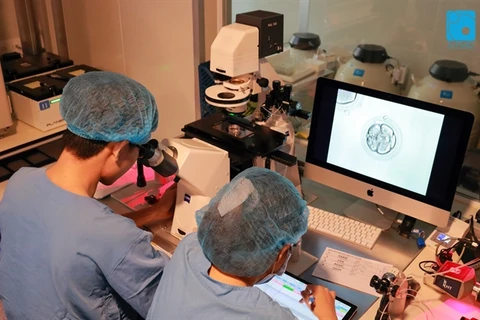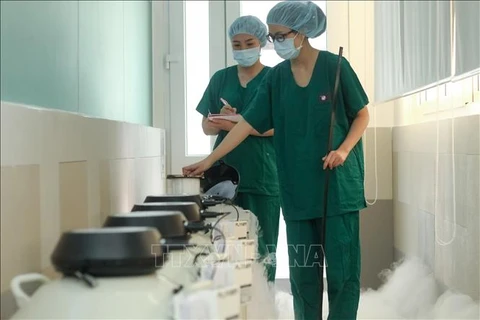Hanoi (VNA) – On April 30, 25 years ago, the first three Vietnamese IVF babies were born at Ho Chi Minh City’s Tu Du Hospital, laying the first brick for the IVF sector in Vietnam.
IVF, or In vitro fertilisation, is one of several techniques available to help people with fertility problems have a baby. During IVF, an egg is removed from the woman's ovaries and fertilised with sperm in a laboratory. The fertilised egg, called an embryo, is then returned to the woman's womb to grow and develop.
This has brought many successes in terms of science and professional development, Prof., Doctor Nguyen Thi Ngoc Phuong, former Director of Tu Du Hospital, recounted at a ceremony held at the hospital on April 27 to mark the anniversary.
Therefore, April 30, 1998, is considered an important historical milestone of the IVF industry in Vietnam, bringing hope to millions of infertile couples in the country at that time.
IVF doctors have paid attention to transferring the technique to localities. In addition, the technique has been recognised and highly valued by the international community, reflected through foreign hospitals’ sending of their experts to Vietnam to learn about it.
Director of the municipal Department of Health Assoc. Prof. Tang Chi Thuong asked Tu Du Hospital to implement specialised activities and techniques, apply artificial intelligence (AI) in IVF practice, and develop a medical genetics centre, a fetal intervention centre, and a neonatal intensive care centre of world standards.
Over the past 25 years, Tu Du Hospital has welcomed more than 16,300 IVF babies. The number of infertility check-ups each year ranges from 55,000 to 60,000./.
IVF, or In vitro fertilisation, is one of several techniques available to help people with fertility problems have a baby. During IVF, an egg is removed from the woman's ovaries and fertilised with sperm in a laboratory. The fertilised egg, called an embryo, is then returned to the woman's womb to grow and develop.
This has brought many successes in terms of science and professional development, Prof., Doctor Nguyen Thi Ngoc Phuong, former Director of Tu Du Hospital, recounted at a ceremony held at the hospital on April 27 to mark the anniversary.
Therefore, April 30, 1998, is considered an important historical milestone of the IVF industry in Vietnam, bringing hope to millions of infertile couples in the country at that time.
IVF doctors have paid attention to transferring the technique to localities. In addition, the technique has been recognised and highly valued by the international community, reflected through foreign hospitals’ sending of their experts to Vietnam to learn about it.
Director of the municipal Department of Health Assoc. Prof. Tang Chi Thuong asked Tu Du Hospital to implement specialised activities and techniques, apply artificial intelligence (AI) in IVF practice, and develop a medical genetics centre, a fetal intervention centre, and a neonatal intensive care centre of world standards.
Over the past 25 years, Tu Du Hospital has welcomed more than 16,300 IVF babies. The number of infertility check-ups each year ranges from 55,000 to 60,000./.
VNA























